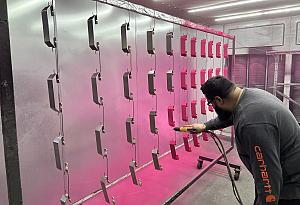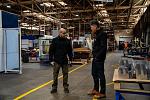- FMA
- The Fabricator
- FABTECH
- Canadian Metalworking
Categories
- Additive Manufacturing
- Aluminum Welding
- Arc Welding
- Assembly and Joining
- Automation and Robotics
- Bending and Forming
- Consumables
- Cutting and Weld Prep
- Electric Vehicles
- En Español
- Finishing
- Hydroforming
- Laser Cutting
- Laser Welding
- Machining
- Manufacturing Software
- Materials Handling
- Metals/Materials
- Oxyfuel Cutting
- Plasma Cutting
- Power Tools
- Punching and Other Holemaking
- Roll Forming
- Safety
- Sawing
- Shearing
- Shop Management
- Testing and Measuring
- Tube and Pipe Fabrication
- Tube and Pipe Production
- Waterjet Cutting
Industry Directory
Webcasts
Podcasts
FAB 40
Advertise
Subscribe
Account Login
Search
'Reasons to push jobs overseas are starting to fall apart'
- By Vicki Bell
- May 30, 2012
Featured in the article is a fabricator who has appeared in the pages of The FABRICATOR® magazine and on thefabricator.com in articles, blog posts, press releases, and podcasts—Drew Greenblatt of Marlin Steel. The title of this post comes from Greenblatt's comments about rising wages in China giving U.S. companies second thoughts about moving their manufacturing jobs to China. That's a good thing—right?
Greenblatt said, "All of a sudden, if your math says, 'I've got to pay the guy $7.50 an hour in Shanghai or I can hire a guy for $12 an hour in Canton, Ohio,' why would I do it in Shanghai? I've got intellectual property issues over there, there's no rule of law, there's a lot of corruption. Plus if I make it here, I get the stuff six weeks faster: there's no freight. So a lot of the reasons to push jobs overseas are starting to fall apart."
As noted in the article, "Other companies are doing the same math. A report in March by the Boston Consulting Group found seven industry groups, selling about $200 billion in Chinese-made imports, that will likely shift production back to the U.S. to duck rising costs in China. That could add between $20 billion to $55 billion to U.S. gross domestic product before the end of the decade, the authors estimated.
"U.S. export gains in Chinese and other global markets will create between two million and three million American jobs, lower the U.S. unemployment rate by between 1.5 to 2.0 percentage points and cut the U.S. merchandise trade deficit by 25 to 35 percent, according to the study.
"China’s economy is still growing at a pace that would feel like wild prosperity in larger developed economies like the U.S. or Europe. But as the last major engine of growth, some forecasters are cautioning that the loss of Chinese demand threatens to spark a wider global slowdown that will crimp demand for U.S.-made products.
"U.S. manufacturers are 'about to face a negative shock from the hit to exports from the deepening European downturn and the spreading impact on demand in other key trading partners in Asia,' said David Rosenberg, chief economist at Gluskin Sheff."
Greenblatt doesn't necessarily think this is a huge problem for U.S. manufacturers. "Most American factories don’t even consider exporting—it doesn’t even cross their mind," he said. "Because it’s easier sell to Denver and Duluth than it is to Denmark."
I hope Greenblatt is right, but don't expect the U.S. economy to escape a China slowdown or the slowdowns in other parts of the world unscathed. As Schoen wrote, "It remains to be seen how badly U.S. manufacturers would be hurt by a wider, deeper coordinated global slowdown. Once recessions spread around the world, they become more difficult to reverse."
Follow fabcomlady on Twitter.
Become a fan of The Fabricator® on Facebook.
subscribe now

The Fabricator is North America's leading magazine for the metal forming and fabricating industry. The magazine delivers the news, technical articles, and case histories that enable fabricators to do their jobs more efficiently. The Fabricator has served the industry since 1970.
start your free subscriptionAbout the Author

Vicki Bell
2135 Point Blvd
Elgin, IL 60123
815-227-8209
- Stay connected from anywhere

Easily access valuable industry resources now with full access to the digital edition of The Fabricator.

Easily access valuable industry resources now with full access to the digital edition of The Welder.

Easily access valuable industry resources now with full access to the digital edition of The Tube and Pipe Journal.
- Podcasting
- Podcast:
- The Fabricator Podcast
- Published:
- 04/09/2024
- Running Time:
- 63:55
In this podcast episode, Brian Steel, CEO of Cadrex Manufacturing, discusses the challenges of acquiring, merging, and integrating...
- Industry Events
16th Annual Safety Conference
- April 30 - May 1, 2024
- Elgin,
Pipe and Tube Conference
- May 21 - 22, 2024
- Omaha, NE
World-Class Roll Forming Workshop
- June 5 - 6, 2024
- Louisville, KY
Advanced Laser Application Workshop
- June 25 - 27, 2024
- Novi, MI































